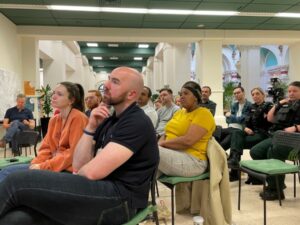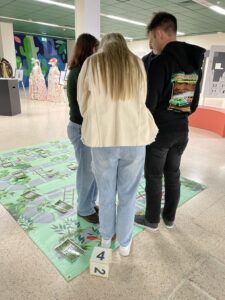Belfast: insights and inspirations
Images and words by Matthew Morgan, Director at the Quality of Life Foundation.
They saved the best til last; the live stage of the CCQOL project reached a fitting climax in the fourth and final urban room in Belfast. Here are some reflections from Quality of Life Foundation Director, Matthew Morgan, from his visit there.
An inspirational urban room
 2Royal Exchange is a large, flexible space in the city centre that includes a variety of presentation and breakout spaces as well as a coffee shop, grand piano, all-day security and meeting rooms. Well-organised and, importantly, free to use, thanks to the generosity of Belfast city Council, the CCQOL team, led by Saul Golden and supported by Anna Skoura and Ruchit Purohit, were able to focus on providing an imaginative series of events involving Ulster university students, local architectural studios, community groups and even actors to engage with the people of Belfast.I was able to talk about the work of the Foundation and discuss the thinking that has gone behind into the framework, in particular what the key themes mean to people’s everyday lives.
2Royal Exchange is a large, flexible space in the city centre that includes a variety of presentation and breakout spaces as well as a coffee shop, grand piano, all-day security and meeting rooms. Well-organised and, importantly, free to use, thanks to the generosity of Belfast city Council, the CCQOL team, led by Saul Golden and supported by Anna Skoura and Ruchit Purohit, were able to focus on providing an imaginative series of events involving Ulster university students, local architectural studios, community groups and even actors to engage with the people of Belfast.I was able to talk about the work of the Foundation and discuss the thinking that has gone behind into the framework, in particular what the key themes mean to people’s everyday lives.
Improving engagement
The University of Ulster opened its new city centre campus this week, and clusters of box-fresh students could be seen excitedly pacing the streets. The new building is beautiful on the inside but provides a glassy face to the rest of the city, with little street activation and some questionable urban planning that turns its back on local estates, many of which suffer high levels of deprivation.

Cue the conciliatory work of Professor Duncan Morrow, who is spearheading the university’s work to establish better ties with local communities and ensure that the university can contribute to the city’s wider success in the year to come. Here he is heading a hugely positive workshop with police, local authority and community representatives, using the Quality of Life Framework as a way of framing a conversation about Belfast’s challenges and possible solutions.
 And here is a group of first-year students playing two games conceived by a long-standing not-for-profit called Community Places. They offer planning advice to local communities and have recently begun to manage innovative participatory budgeting schemes that pool contributions from local businesses to support a range of community projects.
And here is a group of first-year students playing two games conceived by a long-standing not-for-profit called Community Places. They offer planning advice to local communities and have recently begun to manage innovative participatory budgeting schemes that pool contributions from local businesses to support a range of community projects.
Belfast’s challenges
Belfast is a thriving city with good bones, largely thanks to the booming 19th century linen trade, the shipyards and, latterly, the tourists that flock to see both the birthplace of the Titanic and the many locations used in the TV blockbuster, Game of Thrones.
But the complete absence of leadership due to the breakdown of the power sharing agreement and a sclerotic decision-making process in the local authority, have combined to stall improvements to the city’s streets and neighbourhoods.
It wasn’t long ago that the security zone imposed on the city centre emptied it of residents. Attempts to bring people back into the city have stalled due to the council’s decision to hand responsibility for regeneration to a single developer, resulting in innumerable sites being mothballed, waiting, waiting and ever-waiting for some decision about their use and development.
Everyone I met agreed that as a result of all this stasis (perhaps added to which Covid, cost of living, and difficulties on the high street seen across the UK) the city centre has become tired, with rising homelessness and anti-social behaviour.
Green space is at a premium and transport connections – by foot, bike or public transport – are exacerbated by the disconnectedness inherent in a city that is still struggling to heal community divisions.
This deeply-rooted factionalism does little to promote the interconnectedness and long term thinking necessary to overcome the city’s problems.
The good news is that all those people I spoke to acknowledged and understood these problems and are seeking to deal with them, with a blend of stoicism and good humour that was both widespread and infectious.
Good luck, Belfast. See you soon.

Images and words by Matthew Morgan, Director at the Quality of Life Foundation.